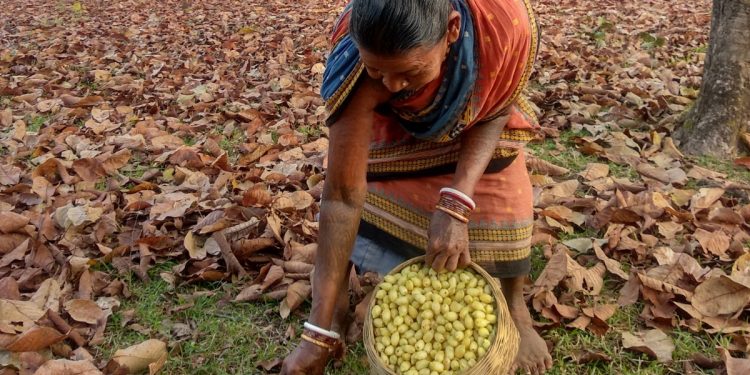Gopabandhu Nagar: Absence of adequate government-supported infrastructure and pricing mechanisms is forcing tribals of the Gopabandhu Nagar block in Mayurbhanj district to sell valuable forest products, such as mahua flowers and sal seeds, at throwaway prices.
The local tribal population here primarily sustains itself through farming and the collection and sale of minor forest produce (MFP).
Residents in several tribal-dominated villages said that after the culmination of the farming season, they spend around six months collecting minor forest produce like broom grass, honey, lac, berries like charkoli, mahua, and sal seeds, which are important sources of income for them.
Also Read: Odisha proposes buying land from distressed tribals, Dalits
But the lack of a fair market mechanism has kept their economic condition unchanged, they rued. “Last month, we collected mahua flowers; now we’re gathering traditional chakoli and sal seeds,” said local residents Purnachandra Singh, Adikanda Singh, Lachhman Singh, Dibakar Singh, Sagarika Hembram, and Deepa Singh.
They alleged that traders were frequently making rounds of even remote villages to purchase these items at throwaway prices, anything between Rs 7 to Rs 10 per kilogram, and later reselling them at much higher prices elsewhere.
Since there is no officially fixed price or formal market mechanism, middlemen and agents are exploiting the situation, they added.
Back in 2008, the state government had instructed gram panchayats to facilitate the purchase of minor forest produce, but villagers said there has been no implementation at the block or panchayat levels since then.
As a result, tribal collectors are often compelled to sell at throwaway prices rather than let the produce spoil and get damaged at home. The issue has triggered discontentment among tribal communities.
Intellectuals in the region argue that opening regulated markets (mandis) for forest products could offer tribals a fair chance at income and economic security.
When contacted, forester KL Saren admitted that at present, there are no active government measures in place to address the pricing or procurement of these goods.
PNN
